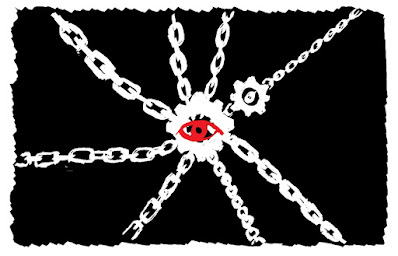Many decry the informal alliance that exists between governments and technology companies, but is it really necessarily bad? Over time, could high-tech spies actually create a utopia? A kind of good, even if it is born of evil?
If widespread enough, surveillance and transparency could actually create a panopticon of accountability, rearing individuals who respond as if they were under the eye of God. While a world of surveillance can be initially created by a sinister Machiavellian elite, those who grow up in that world of surveillance may become beings of impeccable character, committed to obeying the law.
Being treated harshly as one matures, like being watched, could help to bring about significantly restrained and considerate behaviour. Awareness that we can be caught committing crimes, by small devices we may not be able to see, could encourage a steadfast adherence to the law at all times. It could become so ingrained in us that, even when not being watched, we act as though we are being watched.
Good children of the system
Inevitably, any technology-based totalitarianism would at first experience abuse. Those who establish systems of surveillance aren't always inclined to benevolence, but in fact are more likely to be paranoid and unscrupulous. In such a case, we should expect that they themselves are of dubious moral character, perhaps even of a criminal mindset. They likely did many things in their lives that were dependent upon not being monitored, which perhaps makes their decision to create a monitored society somewhat ironic.
A child who grows up in the monitored world of techno-totalitarianism is the future master of that world, because all men die, including the tyrant. Raised in circumstances that deter or detect all crime and immorality, and establish some punishment for it, the new generation should encounter a filter that ensures only the best of them will qualify to represent authority in that society. Intense background checks, barring those with any criminal history from office, may ensure that only the most morally clean individuals may ascend to power.
By the time the original tyrants who established a system of totalitarian surveillance are gone, and replaced with the children they had raised, those in that new generation may be benevolent to a degree unknown even to current democratic forms of government. They will be those who dissatisfied no-one, were never detected committing any offence, and were at all times loyal.
The unaccountable class
There are many potential pitfalls to a techno-totalitarian system. For one thing, one must at first accept repressive totalitarian rule in the first place, which means enduring a lot of injustice and arbitrary power. Another problem is that such a system is likely to create a kind of static adherence to whatever the last ideology was, which was in a position of influence when the techno-totalitarian system was set up. Any ideology that usurps all power and moral authority will deem the others to be criminal by nature. As such, many of the detained or suppressed in that society may not be criminal at all but simply creative thinkers. Finally, there is also the pitfall of class, wherein the rulers are exempt from all modes of surveillance and accountability for their own crimes while monitoring those of a lower class, and those of the lower class are compelled to goodness because of their lower status, official or unofficial, while those who rule have no such obligation.
Because creating a technological totalitarianism requires somewhat unscrupulous behaviour in the first place, it seems likely that a prospective utopia (the merits of which are actually dubious even if accomplished) will be interrupted by one of the pitfalls above. It is unlikely that bad people take any steps to prevent, in particular, the formation of a class of unaccountable people to govern those who are accountable, when ideally all should be accountable.

